Management Approach
Policy and approach
In 1992, we established our Global Environmental Charter and Action Guidelines, and in 1997, compiled our Environmental Philosophy, Environmental Activity Policy, and Code of Conduct into the "TOYOBO Group Fundamental Policy on the Global Environment" and launched a company-wide global environmental conservation initiative.
In addition to reducing the environmental impact of our business activities, we will contribute to society through people- and planet-friendly technologies.
TOYOBO Group Fundamental Policy on the Global Environment
-
Environmental philosophy
We are striving to contribute to society through technologies friendly to both people and the environment, protect the global environment, and to leave a better planet and a more prosperous society to future generations.
-
Environmental activity policy
- (1)
- Development of technologies
By devoting all of our efforts, the Toyobo group is developing technologies (products and manufacturing processes) that are friendly to both people and the environment, and we are promoting environmental measures. - (2)
- Environmental protection
At every stage, from product development through to design, manufacture, sale, disposal, and collection, we are forecasting, evaluating, and reducing their impact on the environment, working towards its protection. - (3)
- Contribute to society
With the aim of bringing about a better global environment, as well as using our business activities, as a good corporate citizen we will actively support and participate in environmental protection and biodiversity conservation activities throughout society and in local regions.
-
Code of conduct
- (1)
- Think : Technical development and evaluation
In development and design, strive to develop environmental technology and evaluate environmental protections. - (2)
- Value: Environmental protection and reuse
Strive to develop, improve, and reuse environmental technologies in the production, sales, distribution, and disposal phases. - (3)
- Participate: Disclose technologies and share information
Strive to disclose developed environmental technologies and provide environmental information. - (4)
- Protect: Environmental compliance and auditing
Strive to set and maintain environmental regulations and self-management standards set by national and local governments, etc., and carry out audits. - (5)
- Train: Internal and external systems
Strive to enhance our internal environment-related systems, and carry out education and awareness-raising activities.
Structure
Our environmental conservation activities (climate change, waste, water resources, biodiversity, etc.) are promoted by the Climate Change and Biodiversity Committee under the Sustainability Committee. We also establish the Global environment Conference and Global Environmental Conservation Conference to promote specific initiatives at our business sites and plants.
The Sustainability Committee deliberates on top-level policies and targets for overall sustainability activities, including climate change response. Receiving the report on a regular basis, the Board of Directors approves top-level policies, targets, and other key matters, and supervises the progress of its activities. In fiscal 2024, the Sustainability Committee met six times.
The committee also manages activities aimed at achieving "a decarbonized and circular society", which are one of the "five social issues" set forth in our “Sustainable Vision 2030”.
The Global Environmental Conference is responsible for formulating and proposing policies and measures for global environment conservation activities to Safety and Disaster Management Division manager and for managing the progress of these measures. The conference is chaired by the General Manager, Environment, Safety and Disaster Management Department and is composed of General Managers of departments in charge of production technology in each business division and the Production Technology Division. In principle, the conference meets once a year.
The Global Environmental Promotion Conference meets four times a year to discuss decisions and implements specific promotion items based on the policy, and exchange information on global environment issues, and decide and implement measures to deal with issues when problems occur. The conference is chaired by the General Manager, Environment, Safety and Disaster Management Department and is consists of members selected by Executive Officer of business units and divisions. They also visit each of our offices, production sites, and group companies to conduct "safety and environment assessment" activities, including supervision of compliance with local environmental laws and regulations.The results are reported during the conference.
Organizational Chart
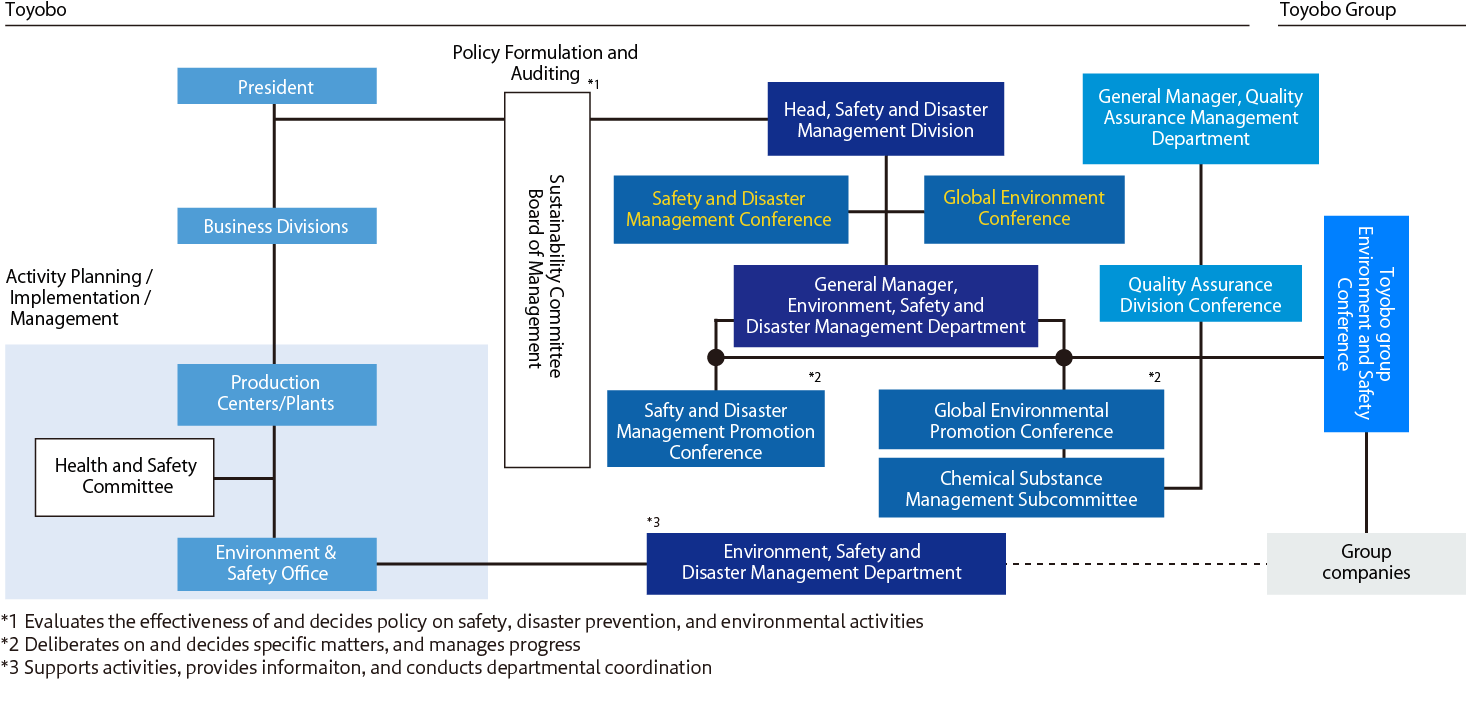
Environmental management system
Basic approach
Toyobo Group extracts and identifies the environmental impact of the activities of each manufacturing site and laboratory on the global and local environment in terms of risks and opportunities. We then establish and operate environmental management systems such as ISO 14001, to maintain and improve each of them.
In addition, in order to improve the environmental management level of our group, the Safety and Disaster Prevention Division has established and is operating company-wide regulations for conducting "Safety and Environmental Assessments" and other activities for monitoring and surveillance.
We continue to provide environmental education for management and employees with the aim of raising awareness of environmental issues within our group.
Certification status of Environmental Management System
As of August 31,2024, 16 business sites (46% of all group production sites: 16 out of 35 production sites) have acquired external certification for environmental management system standards.
Percentage of ISO 14001 certification
・43% of all Toyobo group production sites: 15 out of 35 production sites
・100% of all Toyobo production sites: 6 out of 6 production sites
Business Sites Acquiring ISO 14001 Certification
| TOYOBO CO., LTD. Business Sites | Date of Certification |
|---|---|
| Research Center (Otsu, Shiga) | Dec. 1996 |
| Tsuruga Research and Production Center (Tsuruga, Fukui) | Dec. 1996 |
| Inuyama Plant (Inuyama, Aichi) | Mar. 1998 |
| Utsunomiya Plant (Utsunomiya, Tochigi) | Feb. 1999 |
| Shogawa Plant (Imizu, Toyama) | Jul. 2001 |
| Iwakuni Production Center (Iwakuni, Yamaguchi) | Nov. 2002 |
| Group Companies (consolidated subsidiaries) | Date of Certification |
|---|---|
| TOYOBO MC Corporation, Takasago Plant (Takasago, Hyogo) | Mar. 1999 |
| Toyo Cloth Co., Ltd., Tarui Plant (Sennan, Osaka) | Dec. 1999 |
| Japan Exlan Co., Ltd., Saidaiji Plant (Okayama, Okayama) | Jun. 2001 |
| PT. INDONESIA TOYOBO FILM SOLUTIONS (Indonesia) | Jun. 2001 |
| Miyukikeori Co., Ltd., Yokkaichi Plant (Yokkaichi. Mie) | Apr. 2002 |
| Cosmo Electronics Co., Ltd., (Yokkaichi, Mie) | Jan. 2004 |
| Toyo Cloth Co., Ltd., Iwakuni Plant (Iwakuni, Yamaguchi) | Oct. 2005 |
| Toyobo Photo Chemicals Co., Ltd., Saidaiji Factory (Okayama, Okayama) | Oct. 2017 |
| Toyobo Saha Safety Weave Co., Ltd. (Thailand) | May. 2019 |
| Group Companies (Equity Method Affiliate) | Date of Certification |
|---|---|
| Cast Film Japan Co., Ltd., Tsuruga Plant (Tsuruga, Fukui) | Dec. 2000 |
Business Sites Acquiring “Eco Action 21*”
| Group Companies (consolidated subsidiaries) | Date of Certification |
|---|---|
| Japan Exlan Co., Ltd., Environment Engineering-analysis Center (Okayama, Okayama) | May 2007 |
| Mitsumoto Chemicals Co., Ltd. (Nabari, Mie) | Nov. 2011 |
“Eco Action 21” is one of environmental management systems and was developed by Japanese government.
Safety and environment assessment
To improve the safety and environmental level of the group, the Safety and Disaster Management Promotion Committee and the Global Environmental Promotion Committee conduct "safety and environment assessments" as an internal audit of all production sites, including group companies, in accordance with our company's rules. The assessment includes confirmation of the status of various environmental laws and regulations, environmental pollution risk management, and promotion of environmental conservation activities such as energy-saving initiatives.
In addition to annual self-assessments using a checklist, each site undergoes an on-site audit once every three years and takes corrective action if any issues are pointed out. In this way, we are working to maintain and improve the level of management.
Items to be checked in the safety and environment assessment (partial)
- Implementing identification and compliance of legal requirements, meeting regulation values and notification, for factory operation
- Managing the risk of environmental pollution (risk identification, risk assessment, and implementation of preventive measures)
- Promoting environmental conservation activities (energy conservation, waste reduction, green purchasing, etc.)
- Acquiring third-party certification for its environmental management system
- Implementing appropriate management of chemical substances
- Providing education and training
Locations at which Audits Have Been Performed in the Last Three Years
| FY | TOYOBO CO., LTD. | Group Companies | Audit results |
|---|---|---|---|
| 2022 | 2 business sites | 3 companies | All performed well |
| 2023 | 3 business sites | 7 companies | All performed well |
| 2024 | 5 business sites* | 8 companies | All performed well |
- * Including Takasago Plant.
Corrective Mechanisms for Environmental Problems
Our group has a group-wide system for managing and correcting environmental problems. We strive to prevent recurrence of problems at the site where the trouble occurred by taking emergency measures, investigating the cause, formulating and implementing measures to prevent recurrence, and confirming the effectiveness of the measures. Furthermore, if it is determined that the environmental trouble has a significant impact on other divisions (other offices and plants), the preventive measures are horizontally deployed throughout the group.
Environmental compliance
In addition to complying with applicable laws and regulations, such as the Air Pollution Control Act and the Water Pollution Prevention Act in Japan, the Toyobo group is committed to reducing emissions by not only complying with legal and regulatory standards, but by also making continuous improvements in the prevention of air and water pollution. We will continue to further reduce our environmental impact.
For fiscal 2022 to 2024, there were no environmental-related fines or penalties.
Environmental education
Toyobo group promotes a variety of educational and awareness activities in order to improve the environmental awareness of the employees and corporate officers, including the management level.
During Environment Month, we hold an annual environmental seminar with outside lecturers invited, in which many employees and corporate officers, including the management level participate. In addition, at each business site, we hold environmental exhibitions featuring panels that introduce our group's environmental activities as well as exhibitions of eco-conscious products, and these introduce the Toyobo group's environmental activities to our employees and the local community.
In addition, we are promoting environmental education through a unique curriculum tailored for new employees.
Environmental seminars
In fiscal 2024, the Toyobo group held a seminar on the topic of biodiversity conservation and introduction of environment DNA methods. Both face-to-face and online seminars were held, with a total of approximately 200 participants.
In March, we held the “Biological Survey Results Debriefing 2023,” with approximately 100 attendees.
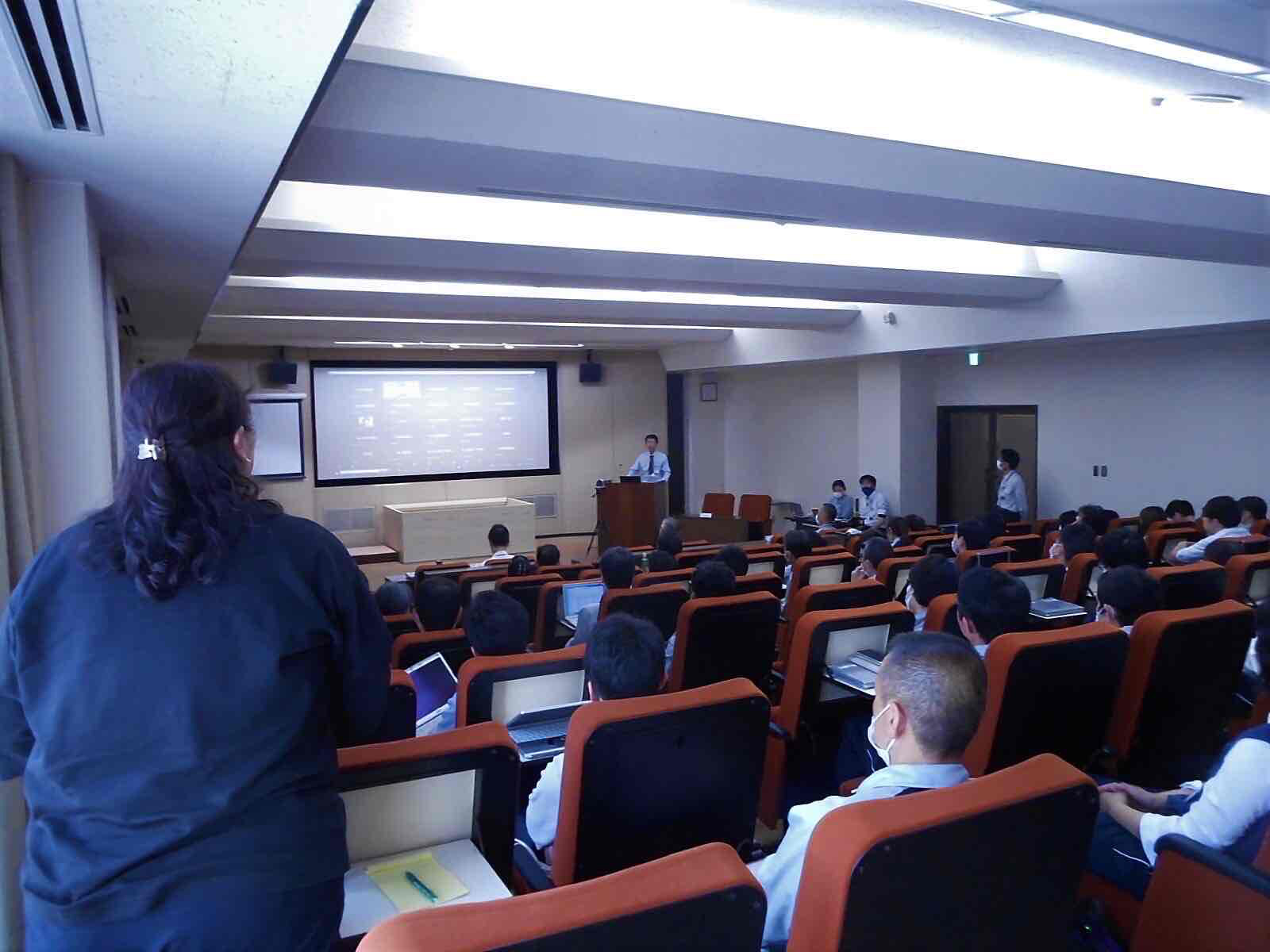
FY2024 Environmental seminar
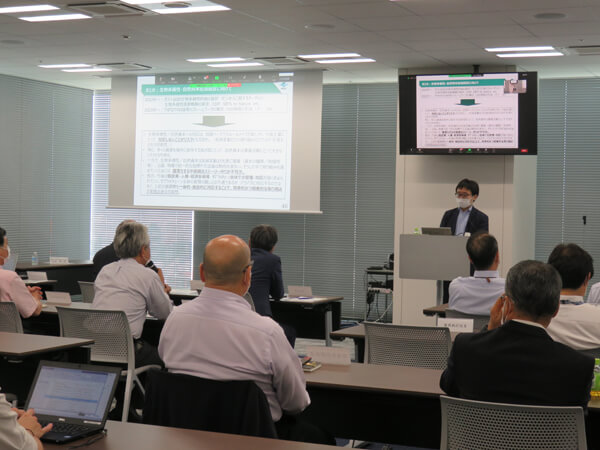
FY2023 Environmental seminar
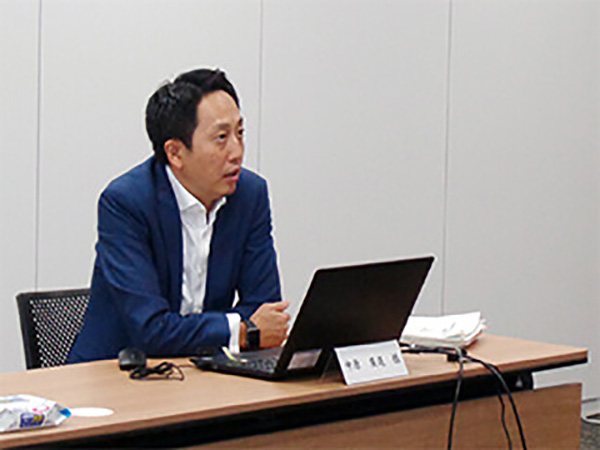
FY2022 Environmental seminar
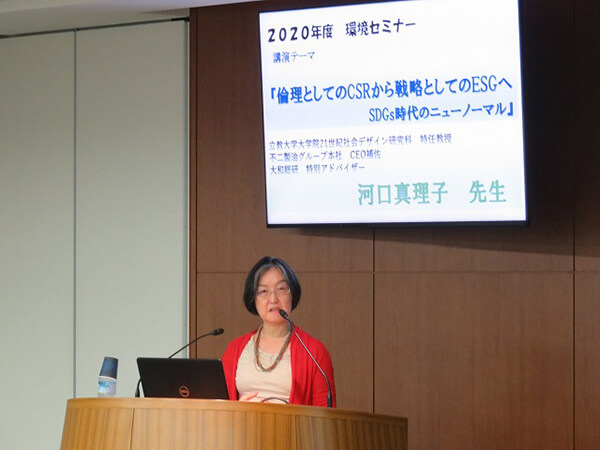
FY2021 Environmental seminar
Past Seminar Themes
- FY 2023: Domestic and overseas initiatives for biodiversity and natural capital-conscious management
Biodiversity and human world (What is required of us?) - FY 2022: Policy trends toward carbon neutrality by 2050
- FY 2021: From CSR as ethics to ESG as strategy new normal in the age of SDGs
- FY 2020: Achieving the SDGs and corporate initiatives
- FY 2019: A changing world with the sustainable development goals (SDGs)
- FY 2018: CSR and corporate environmental activities
Environmental exhibition
Since 1996, the Toyobo group has held an annual environmental exhibition on employee to deepen employees' understanding of the group's efforts to conserve the global environment (since fiscal 2022, the exhibition has also been held via the Internet). At the exhibition, we share our targets and environmental performance data such as greenhouse gas emissions. In fiscal 2025, the exhibition took up a special feature entitled "Efforts by Business Sites and Plants for Preservation of the Global environment and Coexistence with Local Communities" and introduced the activities being carried out at business sites and plants throughout Japan to preserve and improve the environment and coexist with local communities.
Past Seminar Themes
- FY 2024: Efforts by business sites and plants for preservation of the global environment and coexistence with local communities
- FY 2023: Action for "biodiversity conservation"
Environmental education on joining the company
Education upon joining the company is provided not only to fresh hires, but also to mid-career employees at all locations, including at group companies. In addition to explaining plans and achievements regarding the global environmental conservation system and initiatives, the training helps participants understand why environmental protection is important by linking it with the TOYOBO Group Fundamental Policy on the Global Environment, and explains what is expected of employees of the Toyobo group.
Session for management
In May 2024, we invited an outside lecturer to have sessions on the topic of the "Study Session on Legal Liability for Chemical Accidents" for Executive Officer. In particular, we deepened our knowledge of regarding chemical substance leaks.
Past Seminar Themes
- FY 2024: Sustainability and corporate value creation
- FY 2023: Practice of sustainability and disclosure of information
- FY 2022: Carbon neutrality
Other Initiatives
Environmental Accounting
As an initiative to quantitatively evaluate our environmental protection activities, we conduct environmental accounting based on the Environmental Accounting Guidelines 2005 issued by the Ministry of the Environment of Japan. In fiscal 2024, capital investment for environmental protection was ¥3.9 billion, and the amount spent for protection and maintenance was ¥5.8 billion. This primarily includes the cost of statutory environmental impact measurements, industrial waste disposal, various inspection, and associated personnel costs.
Green purchasing
For general purchases such as office supplies, the Toyobo group promotes green purchasing by specifying target items and utilizing "environmental labels."
In fiscal 2024, 11 out of 12 targeted items* were purchased, and the green puchasing rate for all those 11 items was 100%. We will continue to expand the range of items covered by the scheme, keeping an eye on the green purchasing rate and trends in the world.
- * Copy paper, toilet paper, files, tape for label printers, computers, copy machines, printers, fax machines, lighting fixtures (fluorescent lamps except for those for insect control), fire extinguishers, air conditioners (for home use), work clothes and uniforms






